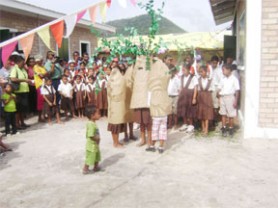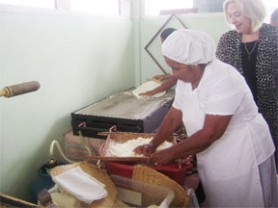Jobs are scarce in the Rupununi. A majority of the mainly Amerindian population farm but markets for produce are scarce too. So it was with a sense of accomplishment that a group of women in Aranaputa, North Rupununi last week celebrated the opening of a new peanut butter factory in the community.

They started with the aim of improving the social and economic welfare of their village, Leona Bremner of the Aranaputa Processors Friendly Society (APFS) said. Peanuts are one of the main crops grown in the savannah region to earn money. The women produced and sold salted peanuts but this was not enough.
In 2002, a local team of peanut farmers joined with the Universities of Georgia and Florida to start the Peanut CRSP (Collaborative Research Support Programme) – Guyana project. The 2004 peanut crop reached an all-time high but this coincided with an increase in imports of peanuts from China, a glut in the Georgetown market, thus lower prices to peanut farmers. A search for new markets led to negotiations with the Ministry of Education for the purchase of school snacks made from locally grown peanuts, cassava and fruits. The Ministry agreed to a six-month pilot project in seven villages in Region Nine. In January 2005, the Canada Fund for Local Initiatives committed funds for the purchase of tools and equipment for the pilot and by February, groups of women were active in the seven villages. By June that year, they were in operation, producing a peanut butter, cassava bread and fruit juice snack for 1,400 students.
Aranaputa was one of the villages. They started under a thatched roof in the compound of the Aranaputa Primary School, Yvette Benjamin of the APFS recalled. She said in the beginning, they purchased cassava and fruits from farmers in the community. They also sold salted nuts and peanut butter in and around the community. It was “very challenging” she said, noting that they baked the cassava bread in the traditional way – on a wood fire.

Bremner added that it took twelve and a half hours to produce 100 pounds of peanut butter by hand. Last week, with the new equipment, they produced the same amount in an hour, she said. The group also purchased 400 pounds of the nuts per year but plan to purchase thrice that amount this year. At the end of 2005, the seven cottage industries were selling $20 million in the snacks to the Education Ministry, Jerry La Gra of the NGO Society for Sustainable Operational Strategy (SSOS) said. SSOS was formed in 2007 to ensure ongoing training and technical support to the women.
With funding and support from several organisations including the Canadian government and the US Ambassadors Self-Help Fund, the factory was built. It was also equipped and has storage capacity. Canadian High Commissioner, Francois Montour, said that they provided close to $3 million. “We have to pay tribute to the women,” he said at the formal opening of the factory last Thursday. US Embassy Charge d’Affaires, Karen Williams, as well as Agricul-ture Minister Robert Persaud and Amerindian Affairs Minister, Pauline Sukhai, were also present at the opening.
The group plans to expand their market. In January, SSOS and the Education Ministry signed an agreement to expand the school snack programme from seven to 33 villages in Region Nine, integrating over 4,000 new nursery and primary school students. Five of the new villages have already started operations and were serving snacks made using the peanut butter made in the factory, La Gra said. He said that by next year, earnings are projected to be $34 million, which would remain in the local economies.
Currently 50 women have steady jobs and this is projected to double by December. There are market opportunities for over 300 farmers and this is projected to reach 500 by next year, La Gra said. He noted that over 15 groups from the private and public sectors, including governmental ministries and bilateral and international organisations collaborated to make the project a success.
Bremner noted that they had already been selling peanut butter to small businesses within the community and said the group plans to serve the region and country. They also plant to produce jams and jellies from local fruits, she said.









